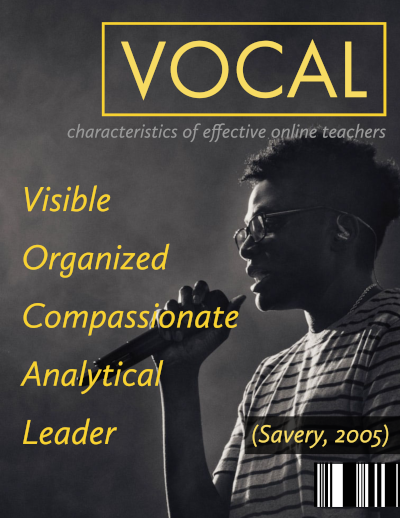Online teaching is teaching, but your role is less of the “sage on the stage” and more the “guide on the side.” Your main job in the online course is not to deliver content but to facilitate learning and engagement. Your presence in the online environment is very important. We want our students to know that they are not alone in this journey. We don’t want them to feel like they are in a “correspondence course” or just learning from a textbook. They need someone on the other side of the screen (you!) who cares and is engaged in their learning and success.
Savery (2005) created an acronym to help conceptualize characteristics of successful online instructors: VOCAL: visible, organized, compassionate, analytical, and leader-by-example.
With this in mind, the starting responsibilities for the online instructor are the following:
Visible
- Engage with the students early by sending an email or creating an announcement the day the course goes live.
- Participate in the online discussions – productive discussion is intentional! Like you would in a good face to face discussion, help to move the conversation along, challenge and guide but don’t dominate. By not replying to every student you encourage student to student interactions.
- “ Online instructors need to be ‘seen’ in order to be perceived by their students as present in the course just as do face-to-face course instructors”. (Mandernach et al, 2006)
- Connecting to students through the use of video to supplement lectures, generate case example, connect with your own practical experience, or bring in current events. These can be delivered on an overview page, alongside of other video content, or in an announcement.
Organized
- Be prepared by reading the text(s) and working through the course material before it goes live. Give feedback to administrators or technical help for any changes that should occur.
- Many students (especially our adult learners) need to work ahead so we suggest opening modules at least 2 weeks in advance and communicating major assignments and their due dates from the very beginning of the course.
Compassionate
- When a student doesn’t hand in work or respond to a message, consider other reasons for this action other than they are just a “bad” student.
- Recheck your messaging – was it in a clear way that all students could understand?
- Are they lacking supporting learning that could help them? (Referrals to the writing center, other online supports)
- Are they having mental health support issues? (Make sure they know where the resources are)
- Do they have a disability issue they have chosen not to disclose?
- Online discussions can be difficult because we can not “read” the faces of the students – be thoughtful of what you and others post.
Analytical
- Ensure you are taking the time to actually grade the assignments. If they are worth having the student do, they are worth using as a way to give feedback.
- An “A” with no comments is not that helpful. Feedback on assignments (including the actual grades) is one of the main ways we can give students a path toward improvement and ultimate success in achieving the learning outcomes of a class.
Leader (by example)
A teacher is a leader more than an information dispenser. Teachers lead with their words, but more so with their actions. What level of work do you expect from yourself? How quickly do you respond to students? How do you model your engagement with the material?
Conclusion
Online teachers are increasing in number and importance. How will you be a VOCAL online instructor, giving your best, and bringing the best our of your students as well?
References
Mandernach, B. J., Gonzales, R. M., & Garrett, A. L. (2006). An examination of online instructor presence via threaded discussion participation. Journal of Online Learning and Teaching, 2(4), 248-260.
Savery, J. R. (2005). BE VOCAL: Characteristics of successful online instructors. Journal of Interactive Online Learning, 4(2), 141-152.


